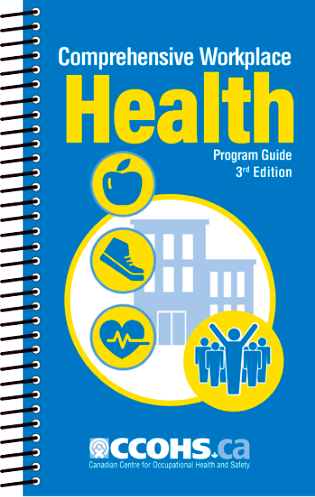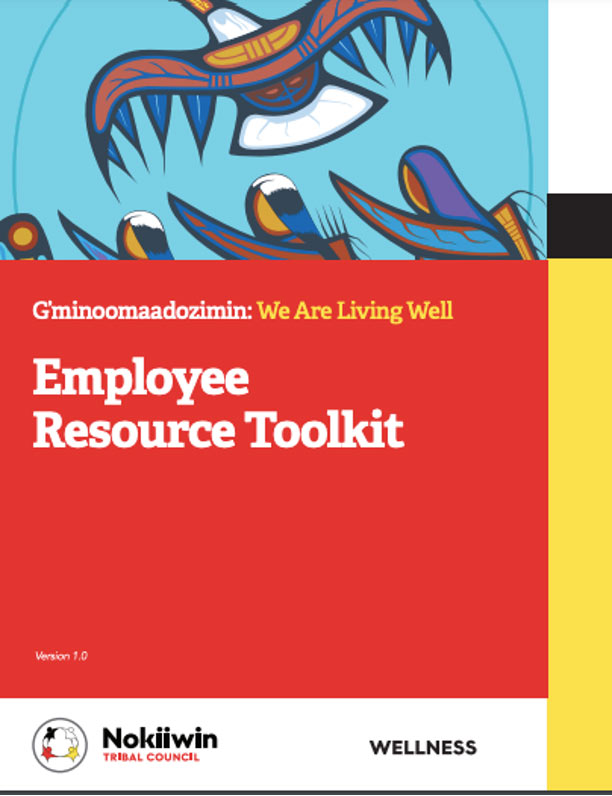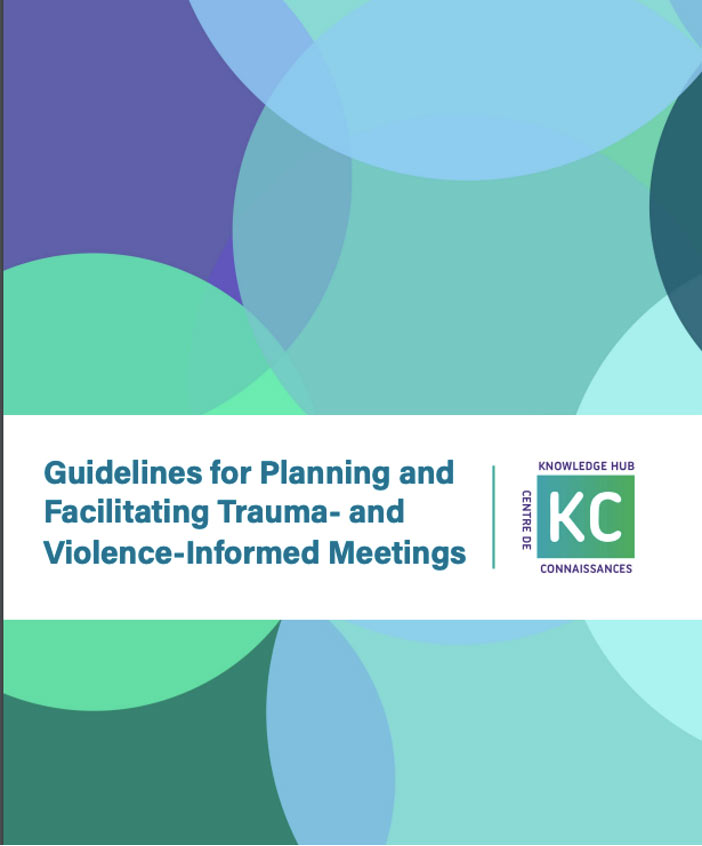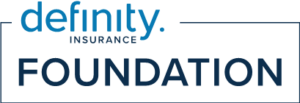Decent work and wellness
Defining workplace wellness
Workplace wellness includes any health promotion related activity or organizational policy designed to support healthy behavior among employees, and to improve health outcomes. When workplace wellness activities or policies use an equity lens, they take into account the varying needs of employees based on social location or intersecting identities. Decent work is about creating equitable working conditions within Ontario’s nonprofit sector; that includes overall employee health and wellbeing.
Decent workplace wellness takes into account the different realities that workers are engaging with, both inside and outside of the workplace. As nonprofits whose mandate is often linked to the social good of society, it’s important that we examine the wellbeing of those facilitating the change. The driving force behind workplace wellness needs to extend beyond the benefits of worker productivity, and center the wellbeing of the organization’s workers instead.
In our engagement sessions with Black, Indigenous and/or racialized workers of intersecting identities, themes of workplace wellness ranked extremely high as an issue of concern. Many workers indicated that decent compensation, and benefits were not enough to keep folks in their respective positions. A culture of wellness, work-life balance, and rest were critical to employee retention.
Comprehensive workplace health program guide
Designed and written as a practical training and reference tool, this 206-page pocket guide will help you establish a workplace health program (or enhance your existing program) by providing information, tips, charts, checklists and illustrations. This guide will assist in the development and implementation of workplace health and wellness programs. It is a practical guide with information designed for both the program leader and the workforce in general. Many of the tips and suggestions can be used as handouts for participants in employee training sessions.
Fundamentally, all decent work indicators within the pathways are directly advancing the wellness of Ontario’s nonprofit sector workers.
Work can play a significant role in what keeps us mentally and physically healthy, as well as what makes us sick and unwell. The Wellesley Institute’s, “Thriving at work: A health-based framework for decent work”, identifies eight key elements that support employee wellbeing.
The eight indicators are:
| Thriving Work Category | |
|---|---|
|
1
Income and Benefits |
Workers are supported in living a full and healthy life by earning an adequate employment income and having access to retirement savings and extended health care. |
|
2
Secure Jobs |
Workers are not afraid of losing their job and have access to stable and predictable hours, income, and schedules. |
|
3
Inclusive Work Environments |
Clear policies are implemented to ensure workplaces are inclusive and meet individual needs so that everyone is able to fully participate in the workplace. |
|
4
Occupational Health and Safety |
Workers are protected from preventable unsafe conditions and hazards at work and workplaces protect and promote the mental health and well being of workers. |
|
5
Reducing Work-Life Conflict |
A working environment is created that better enables workers to reconcile work and personal responsibilities. |
|
6
Job Demand and Job Control |
Demands placed on individual workers match their resources, skills, and capacity, and workers have some ability to make decisions in their day-to-day work. |
|
7
Opportunities for Growth |
Workplaces support opportunities for skills training, learning, and promotion. |
|
8
Participatory and Fair Work Culture |
Workplaces promote participation in organisational decision-making, have a fair process for resolving conflicts, and enable workers to share relevant information within their organization. |
These indicators are consistent with previous research conducted by ONN’s Decent Work for Women project.
Black, Indigenous and/or racialized workers have identified a few areas of the framework that impacted their wellbeing in the workplace. Those areas were, occupational health and safety, and reducing work-life conflict or rather, promoting work-life balance.
According to a Occupational Health Centre position paper, racism results in higher levels of unemployment, precarious employment, and low-wage work which directly impacts the ability of workers to meet their basic needs. Over-representation of racialized workers in difficult and dangerous work leads to the injuries, and illnesses associated with this type of work. The impact of experiences of racism throughout a lifetime can lead to chronic stress and trauma and negatively affect both mental and physical health. Additionally it has been noted that historic and contemporary impacts of colonization, including poverty, impacts of intergenerational trauma, are pervasive (and deeply intertwined) barriers to employment for Indigenous people. Decent workplace wellness must include anti-racism and long term equity initiatives to truly advance the wellbeing of workers.
In conversation with Kris Archie from The Circle
What does it mean to center wellness and decent work at an organization? What kind of practices can be implemented, and what are the challenges and opportunities that exist for all nonprofits to make them a reality? In this video, Kris Archie addresses some of these questions, and shares learnings from their own journey at The Circle.

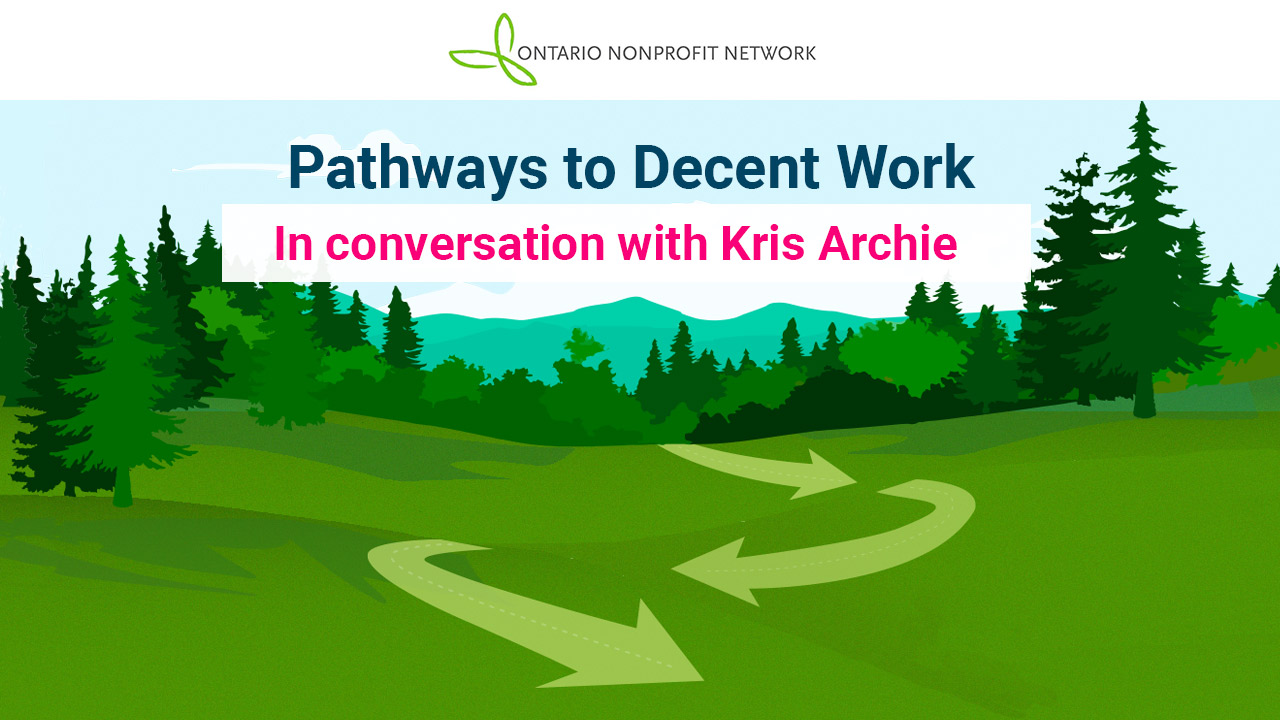
Healing justice
Healing justice can be understood as a pathway forward to embedding equity within wellness initiatives. It seeks to transform oppression, bring reconciliation and resilience, and allow for reimagining our communities, and our broader society. Healing justice is a framework that recognizes the impact of trauma, and violence on individuals, and communities, and names collective processes that can help heal, and transform systemic oppression. This form of justice includes healing, well-being, and not only surviving, but thriving.
Resiliency and healing are strategic – we need everyone in our movements to have access to healing from trauma and violence as it strengthens all of us and all of our movements.”
– Melina Laboucan-Massimo, Indigenous Climate Action, Co-founder & Healing Justice Director
Healing justice moves beyond self-care practices, and acknowledges the collective nature of healing and wellness.
Resources
Reducing work-life conflict or promotion of work-life balance can prove to be a challenging task for employees, and employers within nonprofit organizations. The demanding need to support communities on the frontline, and push forward public policy agendas to advance public and social good places, puts a lot of pressure to ensure outcomes align with mandate. 98% of Black, Indigenous and/or racialized employees across the nonprofit sector cited burnout in our engagement sessions.
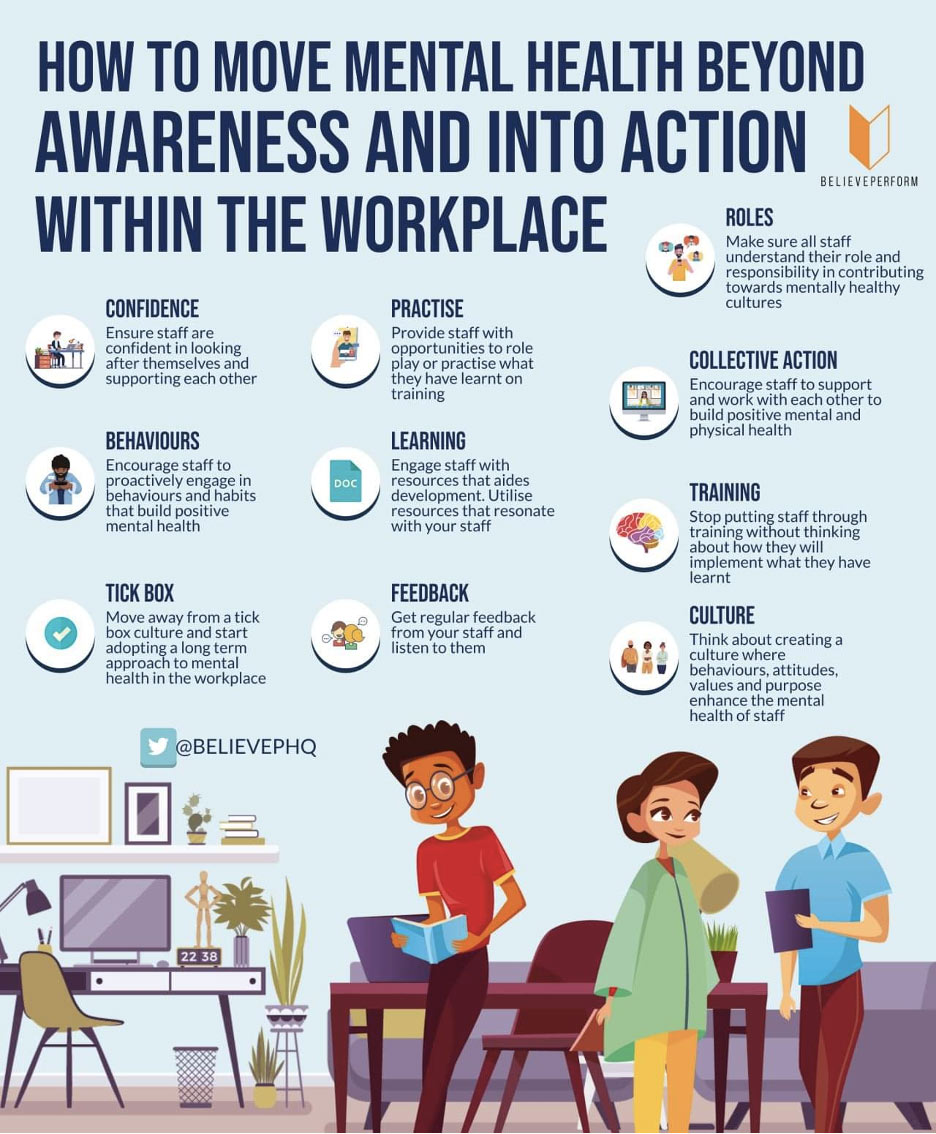
We had moved to a four-day work-week within my organization due to sheer burnout, employees of the organization weren’t able to keep up with demand, so we made an executive decision to shift our working schedules”.
– First Nations Manager, Social Services, Bruce County
In Pathway Five, we address the ways that organizations can rethink scheduling practices, and align them with equity goals within your organization. In the article, Moving beyond examples and into action: Decent work as a practice, ONN highlighted a training in which participants collectively explored the intersections of race and time, and the need to construct new time realities.
Behavioural and organizational practices that emerged within the session included:
- Stop praising speed. Intentional and well thought out work plans take into account how ableism shows up in the workplace; acknowledging that some folks will excel in short term projects, while others more long term.
- Implement shut down periods after major events within the organization that impact staff capacity (i.e. conferences).
- Be data informed, not data driven. Be scrupulous about what needs metrics and why data is being collected.
Changes to our relationships with time can help organizations promote work-life balance. Each employee, employer, and nonprofit will have different needs and ways of approaching work-life balance challenges. There is no one size fits all model, even within the health-based framework. Nonprofits are encouraged to engage in courageous conversations about the decent work culture they want to build, and take the steps necessary to make that a reality. No step towards advancing decent work is too small.
Resource
The Nokiiwin Workplace Wellness Toolkit is a response to the growing need for education, training, and skills for First Nations employers to create healthier and safer workplaces.
G’minoomaadozimin projects are designed to improve First Nation health & safety awareness and systems. Through the delivery of culturally competent programs, resources and tools, G’minoomaadozimin promotes health and safety practices and behaviours that enhance the overall well-being of individuals, families, workplaces and communities.
| Our organization/nonprofit has made an explicit written commitment ( HR policies, strategy to address workplace wellness with an equity lens). All leaders, including senior leadership, and the board are committed to addressing issues of wellbeing. | |
| Our organization/nonprofit assesses workplace culture of wellbeing through routine staff check-ins, surveys, and one-on-one conversations with employees. | |
| Our workplace wellness initiatives address the needs of equity deserving groups within the organization. (i.e. how racism impacts wellbeing) | |
| Employees have connections to external facing wellness benefits/ supports when needed. (i.e health savings accounts that allow employees to access elders or spiritual healers within their community) | |
| The organization/nonprofit promotes dialogue around the challenges of workplace wellbeing among employees. (i.e. there is a shared culture of understanding the challenges of workplace wellbeing) Leadership also models sharing of challenges through staff check-ins. | |
| Trauma informed workplaces policies and practices are available to employees. | |
| Implementation of wellness practices/ initiatives/goals as part of employee work plans. | |
| Our nonprofit’s bereavement leave has mechanisms to ensure employees can take time off for non biological family i.e. chosen family, pets, community members without having to use vacation time. |
Creating trauma-informed workplaces
In recent years, nonprofits have had to confront issues they never expected, and find new ways to support their employees through multiple traumatic experiences. We know that employers, and employees do not exist in isolation from their communities. When incidents of brutality occur towards racialized communities, it can have an impact on employees who identify with, and are a part of those communities. We also know that occurrences like sudden death within a family or within a nonprofits community can have a profound impact. If anyone in our sector can experience trauma, then trauma-informed organizational practices should be considered across the whole sector, and not limited to frontline workers or human-services based nonprofits.
Trauma can be experienced as a one-time event, or as chronic and long-term.
- A single traumatic event can be a car crash.
- Chronic, long-term trauma can include experiences such as ongoing childhood neglect or sexual abuse.
Trauma can also be experienced by a collective or community through oppression or major historical events.
Examples include:
- Racism and the trans-Atlantic slave trade.
- Colonization and impacts of Residential Schools.
- Ongoing experiences of systemic poverty.
How trauma may show up in the workplace:
- Death of family or community members.
- Having to navigate through large-scale health crises, like COVID-19.
- Witnessing a co-worker experience intimate-partner violence or sexual violence and harassment.
- Microaggressions in the workplace
- Experiences of interpersonal and systemic sexism, racism, homophobia, transphobia, ageism, ableism
- Repeated experiences of harsh criticism from peers or someone in positions of power (i.e. not constructively delivered, but delivered with accusations and assuming bad intentions)
Emotional trauma in the workplace manifests itself as absenteeism, lack of participation, task avoidance, employee conflicts, accidents or loss of motivation. All nonprofit organizations are going to have employees that have experienced trauma. Being a trauma-informed nonprofit doesn’t mean you are expected to be counsellors or therapists, it simply means you are thinking about human experiences that naturally occur.
Guidelines for Planning and Facilitating Trauma- and Violence-Informed Meetings
This guide, created by The Knowledge Hub, is a reference tool for those involved in in-person, virtual, or hybrid meetings that support trauma- and violence-informed practices. It provides suggestions for incorporating trauma- and violence-informed principles into planning, hosting, or attending meetings. Proactive consideration of how to make meetings more trauma- and violence-informed can increase feelings of safety, trust, support, collaboration, empowerment, understanding, and connection for participants and peers.
The Knowledge Hub is an initiative of the Centre for Research & Education on Violence against Women & Children at Western University.
Disability justice and decent work
The recording below is of a learning session hosted by Toronto Neighbourhood Centres, in collaboration with Toronto North Local Immigrations Partnership and ONN. It lays a foundational understanding of the AODA landscape, envisions the intersection of disability justice and decent work, and builds our capacity to reimagine concrete ways to transform our work, and workplaces.

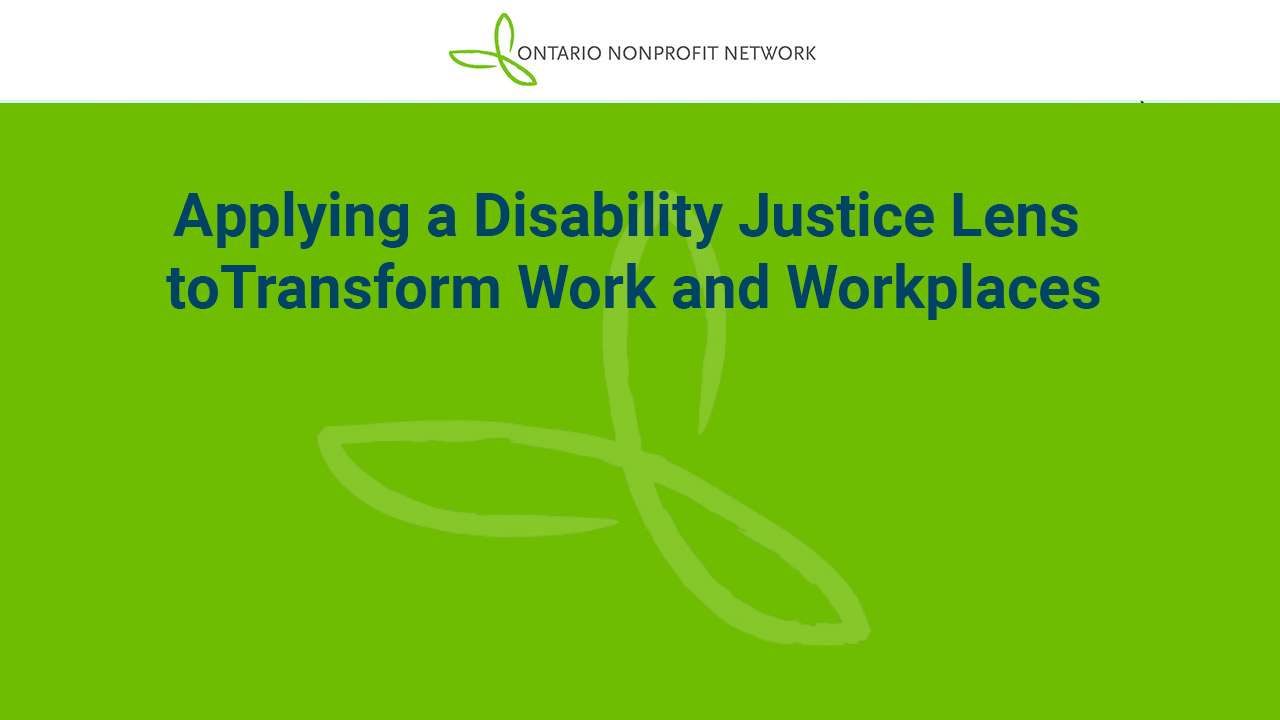
Food for Thought – The intersections of decent work, wellness, anti-racism, equity and EDI Practitioners and Communication Professionals
There is a need to protect and think through wellness for all workers within the nonprofit sector and beyond. For organizations that are seeking to engage in decent work practices to advance equity, truth and reconciliation and anti-racism, it is critical to remember that workers within your organization that are responsible for communications and EDI practitioners experience often forgotten impacts of fielding oppressive, racist, homophobic, sexist, etc attacks through supporting organizations or communicating about advancing equity.
For example: Someone who is responsible for managing communications for a b3 organization might be subjected to regular comments of anti-black racism. Another example is EDI practitioners who are responsible for delivering capacity building or educational training are likely to hear comments that are discriminatory, oppressive, violent or harmful.
How to support communications and EDI workers
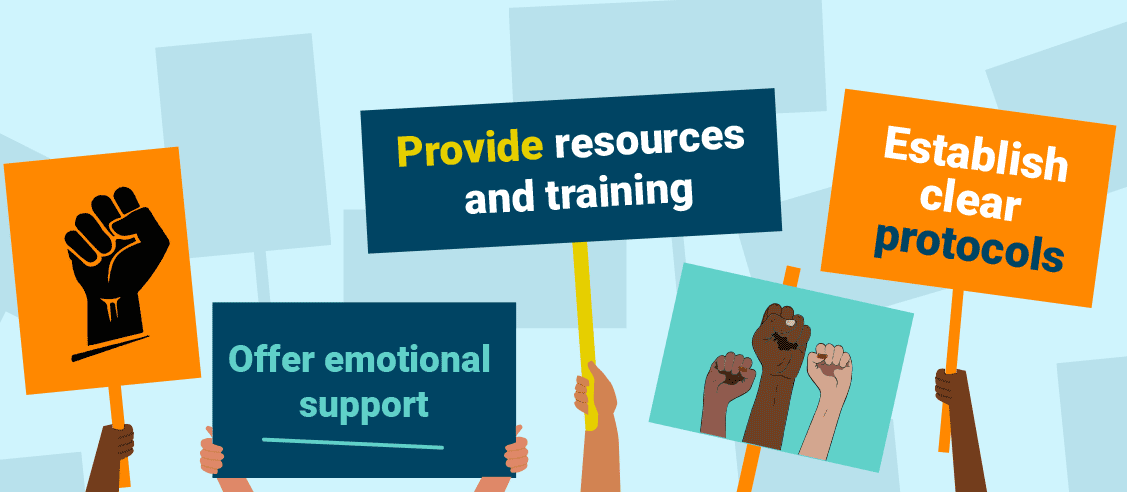
Provide resources and training
Offer resources and training to help communications professionals navigate online harassment effectively. Equip them with strategies to handle difficult situations, such as de-escalation techniques, block/report functions, and guidelines for engaging with online communities.
Establish clear protocols
Develop clear protocols and guidelines for handling online harassment, and in-person incidents. Ensure that communications staff and EDI specialists know how to report incidents, receive appropriate support, and escalate issues when necessary. It is common for practitioners to become numb to the exposures as part of their jobs. Having a documented, and informal process in place helps create a sense of security, and empowers individuals to take action.
Offer emotional support
Provide emotional support to communications professionals who face online harassment. If possible, offer access to counseling services, peer support networks, or employee assistance programs. Encourage an open, and supportive work culture that validates their experiences, and provides a safe space to discuss challenges, and seek guidance.
